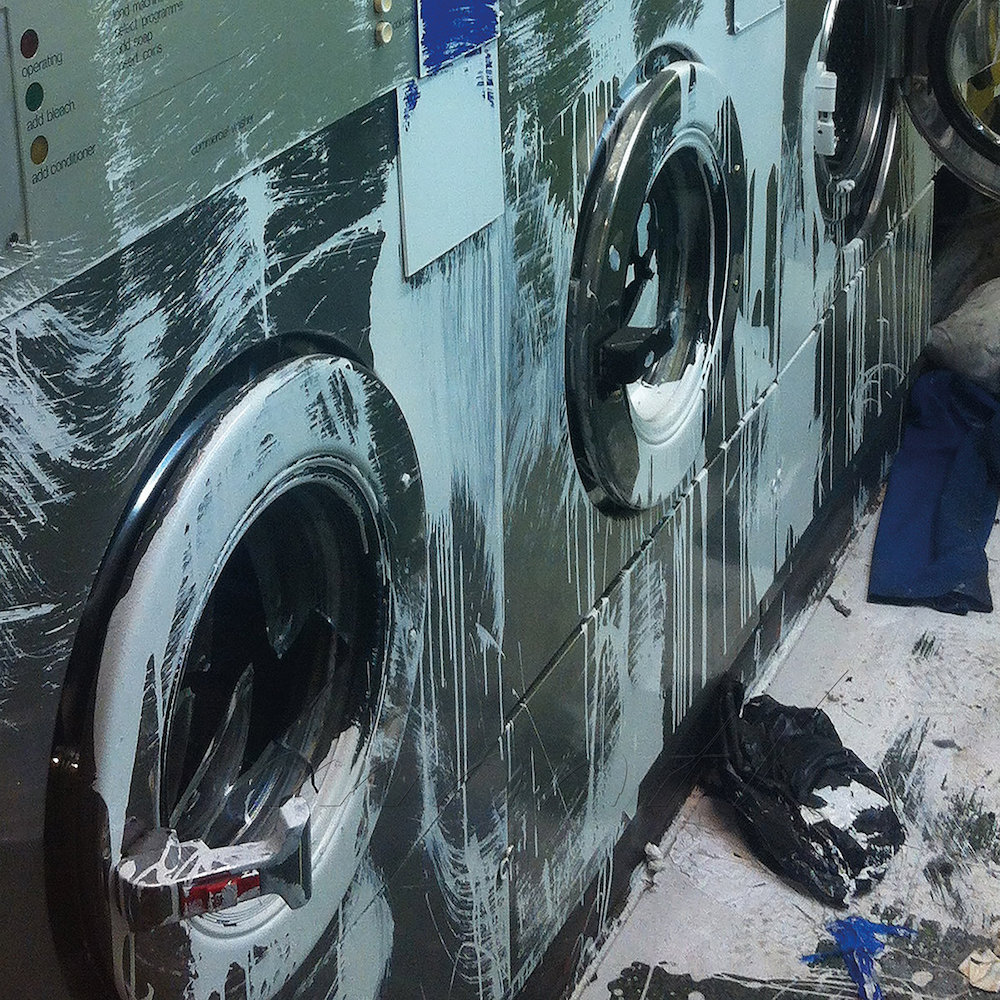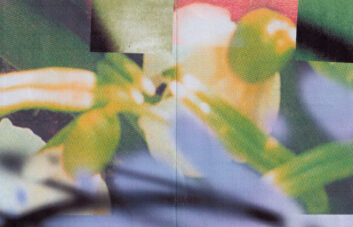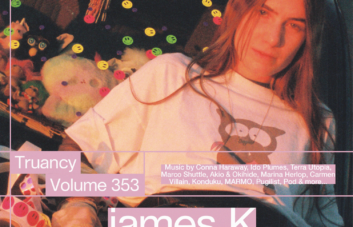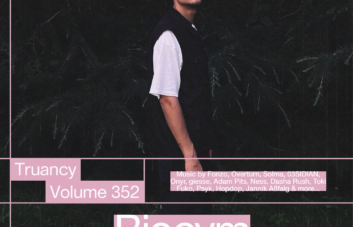Returning eight years after their original debut on Blackest Ever Black, Raime’s cranky distant relative, Moin, returns with a new offering on Nic Tasker’s, AD93 imprint. On the surface it feels like a familiar format. Crunchy guitars layered over a powerful and propulsive rhythmic section. If I didn’t know better, I could have lost the last twenty years of my musical narrative, before the abstract electronics of Aphex Twin, and sub low frequencies of DMZ took me on a twenty year love affair, away from Dischord era punk banks, through basement clubs and dub sound systems.
Obvious references to Steve Albini, Slint and Fugazi sit on the forefront, although to immediately put, ‘Moot!’, in the same vein as these groups is to miss the nuance at work here. The blueprint is fed through Raime’s molecular structure with Joe Andrews twisting and contorting Valentina Magaletti’s rhythmic skeleton and Tom Halstead’s steady and relentless groove. There’s a constant flow of studio manipulation that’s subtle enough to not take away from the live feeling of the record, but enough to make it feel rejuvenated and particularly bracing. Sitting between familiar tropes in a way that invokes nostalgia and reinvention at the same time.
It’s gritty and urgent but with a playful manner that reflects Andrews and Halstead’s desire to put music out with a little less deliberation than normal. It’s a marked characteristic that’s reflective of the rawness of grime and jungle, influences which the duo have long since worn on their sleeve under their other alias. Sitting down with group, there’s a buzz that feels like the last twelve months hasn’t done much to crush the trio’s spirit. Far from it, they’ve found a shift in gear to be energising and creatively empowering. The conversation felt light and jovial as we talked through the ins and outs of the recording process, staying creatively motivated and the serendipitous nature of how the record came to be.
Was the record recorded within the past year and with that in mind, were you guys in separate places or were you in the same spot?
Joe Andrews: Yeah, the record was recorded over a year ago now. Tom and I live pretty close to each other, and predominantly made the record together over that period of time, but Val you were elsewhere weren’t you?
Val: Yeah I was at Hackney Wick then wasn’t I?
Joe: Well I think you were in the Wick and then you went away. When we were making the record you were in Italy, I think?
Val: Yeah, a couple of months.
Valentina you’ve been so busy this last year, I don’t know how you’ve done it.
Val: You know, I keep hearing this, and I find it funny because you don’t say, people that have like a nine to five job are busy. That’s what I do for a living so you’ve got to be busy. Yeah, I’m prolific I would say, but that’s the job so I’m as busy as everyone else that has a job I guess.
Yeah, absolutely. That’s a fair comment. Well thanks for taking the time to sit down with me guys, it’s, it’s a pleasure to chat to you. The record sounds amazing. I’ve been really enjoying it so let’s start there. I think most of our readers – I’m not sure how familiar you guys are with Truants and the platform – but I think most of our readers will be pretty familiar with what Tom and Joe have done with Raime but maybe not as familiar with how Moin came to be and how you guys started. So I guess maybe we could start there in terms of what were the initial thoughts creatively? Why did you guys want to go in that direction? I mean it’s been quite a while since you released the first EP where did it all begin?
Joe: This record just began like we had a week. Everyone has to work you know, we’re not full time musicians, unlike Valentina. We’d love to be but it’s not always possible so, you know, we have periods of time where one of us takes some time off work. We’ll have a bit of time blanked off and be like, right we’re gonna just go at it for a week or a couple of weeks and see what happens. Honestly, we’ve gotten to a point with Raime where – like all projects – you’re just not that hyped. It’s not because of the actual project itself but just because of the working practices.
There’s times when your working practice gets repetitive and the way that you’re trying to be creative gets repetitive so you’re kind of looking for a break. We just sat there, you know, I can’t remember which one of us said it but we just thought, all right, well, why don’t we just make a Moin record for the fuck of it. Let’s see if we can write a record in a short couple of weeks, which, if you know us, is just absolutely absurd. We like to take insane amounts of time over music so it’s just refreshing. It was just a really fun time to see what happened and to be honest. A lot of creativity happened when it works is those spontaneous moments and I think it all just started to fall into place. We really enjoyed it and didn’t put too much pressure on it. We weren’t trying to be reinventing the wheel.
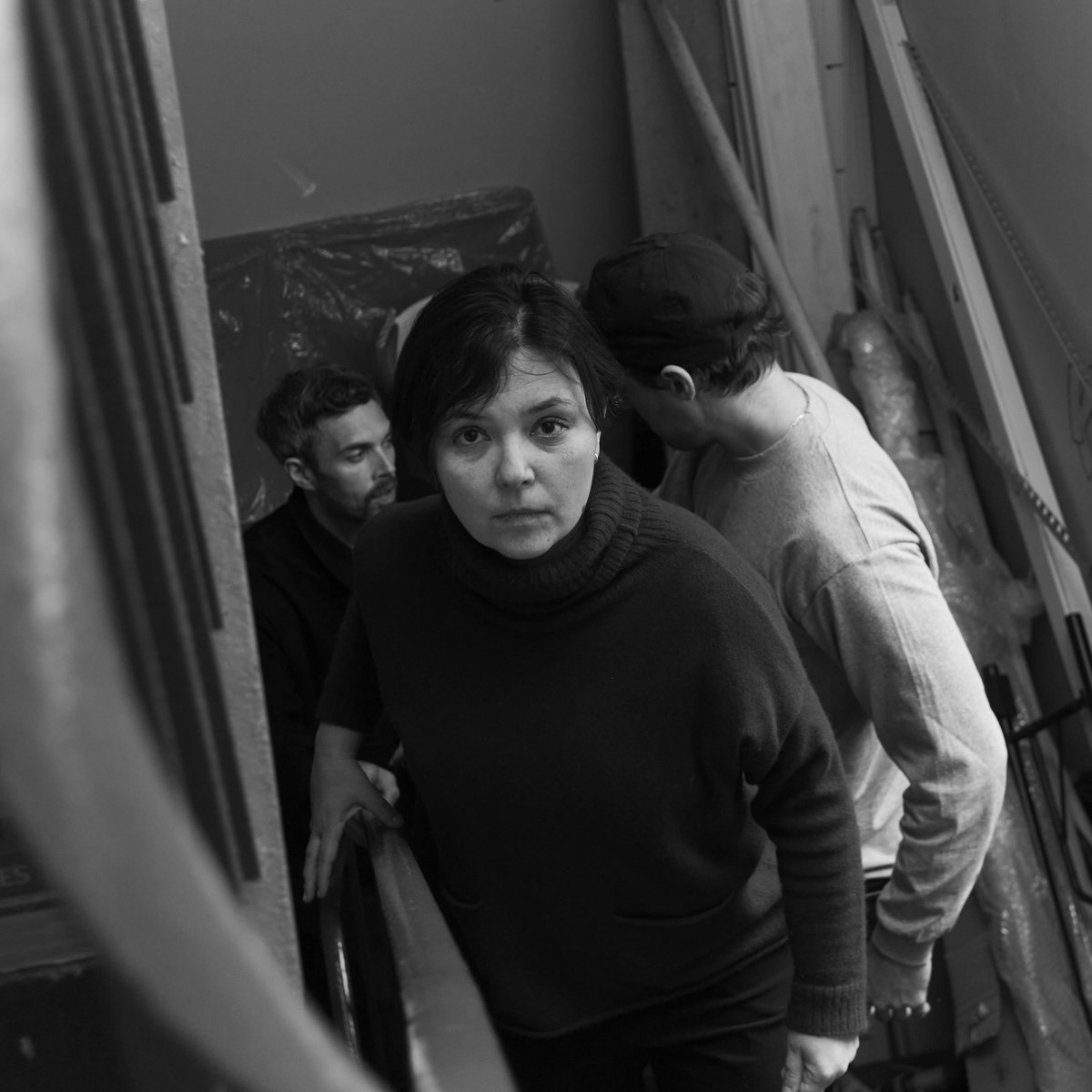
It’s interesting to hear you talk about the fact that you guys take a long time over music because I’ve heard you talk in relation to grime and jungle and stuff like that about this feeling of urgency. How fast that some of that stuff was coming out as well. It’s interesting to hear that you guys normally take like a lot more time over your music.
Joe: Yeah, I don’t know if it’s necessarily a strength. It’s just how it rolls, we’re basically both pretty specific about stuff.
The first EP that you guys put out with Moin on Blackest Ever Black was around 2012. What was the decision to bring it back now?
Tom: I mean our experience of doing that EP the first time around, it’s kind of a similar reasons, in the sense of you’re changing the format. Working with guitar band music, there are certain parameters that, you know you can be sure of. There’s drums, bass, guitar, as a starting point. That limitation is liberating for us. I think within the electronic sphere, the endless possibilities, and I don’t know, listening to too much electronic music for the past years. We needed an outlet that was more spontaneous within a kind of already established format.
It feels very fresh. The record has this really kind of fantastic driving, propulsive sound that really reminds me of artists like Big Black or Fugazi and lot of DC punk era stuff. Obviously Valentino’s work sits very closely at the centre of this. These very strong rhythmic elements. I’m interested how those two worlds – because it is guitar music as you say but that groove and rhythm feels very club influenced. I’m interested to hear how those like two worlds intersect for you?
Joe: If you look at the structure of all of those tunes, they’re essentially just structured like dance music. That’s essentially what it is. That’s where we come from, the reason why, you know, the percussive side and what Valentina does is so fundamental to us is. We come from rhythmic music. We come from bounce music. The bass and drums have really been the fundamental foundation. Every time you start one of those tunes that’s what comes first. The formats of dance music are quite simple; introduce elements, let them run a bit, take them out, have a hole, smash them back in. It sounds very simplistic but that’s really what it was and obviously then to start with that formula is really fun because you can make things work really quickly.
As you start to produce a record and you start to discover different things you start to weave different complexities into it, but ultimately that’s how it first started. So it was kind of like taking all the things that we liked from all the guitar bands we were always excited about and then, somehow, you know, aligning that with studio production, which is essentially what electronic and dance music is and that just felt fresh. It felt kind of fun. It restricts you from also trying to be too clever in those situations which, like we were alluding to earlier, the complexity within electronic music is infinite and inexhaustible. That’s a wonderful thing and obviously the technology involved with that has increased a hundredfold. Those kinds of limitations have obviously facilitated some absolutely incredible music, none of this is a reaction to something that isn’t amazing. It’s just a personal desire to be like, making things basic and quick.
It feels like a very fun record. It’s such a big sound as well, with seemingly few elements as you were saying. Do you go through a process of building things up and then reducing it down, or do you already have those limitations on you in the setup of the band, or the group?
Joe: Yeah, I don’t know. I guess the starting point is always Valentina. Valentina always brings that amazing, rich percussion that makes us have somewhere to start. So, we’re just leading off that most of the time, to be honest, and try supporting that in different ways. Tom, essentially, does all of the guitar work on this and it’s a it’s kind of a fun process because Valentina pretty much goes first. Then Tom will come in second and we’ll try to work around that. Then we start to bring in samples and textures and other things or vocal samples that give us quite a fun… We always think about old hardcore when we think about those vocal samples because you’ve just got these perfect, old hardcore, emphatic, kind of like, in spirit semi opaque but inspirational phrases. Yeah, it’s just a steady progression. We’re definitely not reducing it at all. I don’t know if I’m getting this right guys?
Tom: No, I think you’re right. It’s building blocks. I mean it’s all kind of blocks to a certain extent and we actually try to get beyond the blocks, so that it sounds like a comprehensive tracks as a whole.
Valentina: It’s like Lego with textures.
Tom: Ignore what I just said.
Joe: Let’s go with that man.
You mentioned the vocal samples and I’m curious where they came from and if there was any kind of thought behind that in terms of like, you know, what was included there, or who did what, because there’s there’s some things that sound a bit more sample based whereas some things feel much more like ‘vocals’.
Joe: You know, we’re electronic producers, we’ve always been into sample culture, they’re pretty much all samples. Their origins are either nicely found samples, or there’s other origins where they’re YouTube basically. We’ve recorded YouTube fail comps, which are like 12 minute, obviously people just falling over and getting hit and shit, and you know he’s screaming and saying “oh no”, “oh fuck”, that kind of stuff, and then put them through various processors, aligned them with various different other textures, and synths, like gentle synths and stuff to produce this kind of fragmented, textural approach to it.
Essentially they’re both trying to do the same thing, I suppose. As I mentioned before they’re both trying to be sort of enigmatic and emphatic, but at the same time being non specific, and also you know, feel like they mean something. I mean that we’ve always been doing this, we always like playing with that feeling because going back to hardcore or any kind of old sample records that was always the most enjoyable part where you have something that feels like it’s poignant, but doesn’t deliver enough so that it overtakes things and rules the roost. In fact, it just becomes another element in the track that bears and adds to its character, and its creativity, but also doesn’t really dominate like a traditional vocal in a in a band set up would.
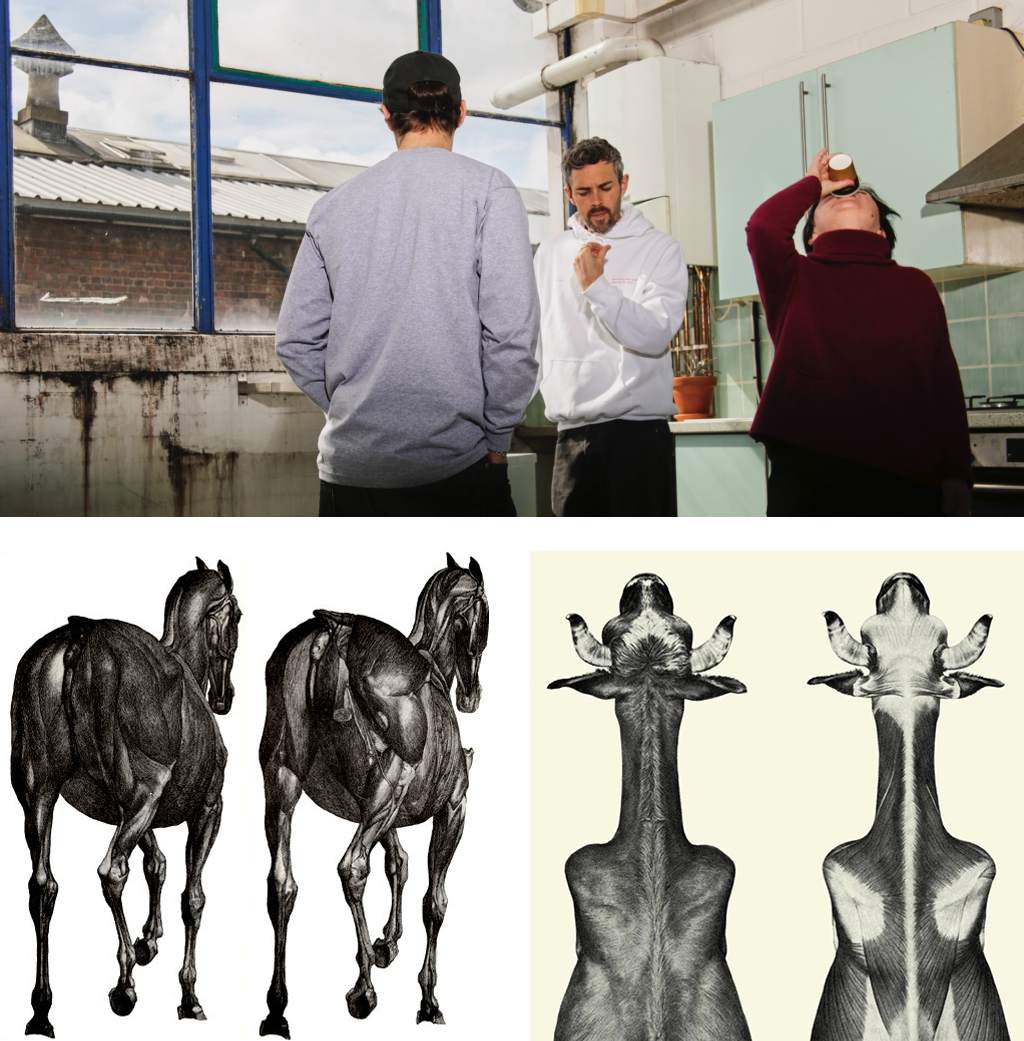
It’s quite interesting that you said you recorded the YouTube fail comps and obviously we were just talking about how this was quite a fun record and something that was really enjoyable to put together. It feels like there’s this very human or humorous element running throughout. Do you think there’s maybe a misrepresentation of you guys as being quite serious?
Tom: We are trying to loosen up on this record so, “fun”, using that word lightly. I guess it’s about the energy you’re putting into it and it’s like, we didn’t want this to be just, you know, it’s got to fly, the record, or you don’t want it to be really too rooted. I guess the samples, as was just said, they’re a setup, rather than a definitive.
Joe: That’s a good way of putting it man. It’s all about composition, and the points on which they come in have been composed very specifically. They don’t just happen and hopefully they feel like they do but they’re just character points in that particular point in the composition that sets up the next proposition or whatever.
Sure. Totally. Valentina, correct me if I’m wrong but I feel like you come less from the electronic music side of things and more from this kind of band side of things, in terms of your influences, would that be fair?
Valentina: I have because I’m a drummer, so it comes with the territory. The percussive elements always shift me towards, industrial, tribal, jazz, but I mean, I would say I’m an avid listener. So obviously electronic music always informed my sonic palette in terms of, I always wanted to emulate, you know, electronic sound by playing. Obviously, you know, acoustic but yeah, I would say that it’s just the nature of the instrument I play that is like a little further from programming I guess.
Yeah obviously that comes through, also with your other work like Holy Tongue, but I’m interested how coming in from those different angles, kind of, you know, helps to kind of inform the sound I guess.
Valentina: There’s such high value in dub. You know, you can’t disregard that. It’s just incredible. It’s just the Mecca. It’s like the ultimate starting point. And then, you know, sometimes I sample it but I like to emulate that. I’m not a junglist. I have a certain taste for sound and that’s what it is really,
I think all three of you are pretty relentless diggers as well right?
Joe: Yeah, never stopped. Never will man. It’s dangerous.
I think it was you Joe, in your Boiler Room Collections, that introduced my to No Trend and that amazing record.
Valentina: There’s got a box of No Trend that is actually really special with all the fanzines. It’s really…
Joe: Yeah, it’s beautiful.
I didn’t see that actually but I’ll definitely have a look for it. I think Philip Sherburne did a great piece on on them sometime last year which kind of brought them back into my life a little bit but, on the Boiler Room I remember you talking a lot about this idea of repetition and texture, and these rhythmic devices in what is otherwise quite direct and aggressive music. I guess I’m curious about how your work with electronic music affects how you approached the live sound and, diving into that a little bit, in terms of how it sounds like a very straightforward live setup but how is that process then developing from an electronic music perspective? Thinking about this idea of texture and sound design.
Joe: The way in which this record is actually created is definitely in a traditional way of making a band record. Valentina, as I said, it’s good to start with Valentina because the reason it all does start with Valentina is that what we do is essentially, we go into a studio and we do a recording session for a long period of time it’s usually about an hour, an hour and a half of work.
Valentina: You just give me a coffee and a BPM.
Joe: Just a click in the headphones, and yeah, get as many coffees as we can down Valentina’s neck and then essentially Valentina just freestyles and, you know, obviously such an incredible talent, so she’s able to be interpreting and essentially freestyling for that whole period of time in which we give completely awful input and kind of prompts. I say awful because we’re trying to articulate what we have in our heads, which is always difficult from person to person right? It’s never a simple thing but Valentina, we’ve been working together for a long time now, 10 years, something like that. So she’s kind of used to how we roll, and that’s kind of where it all starts and then we’ll take that whole session and we’ll go back to the studio, and essentially pour over it, and create the record out of that session by taking the bits that we want. You know, sometimes augmenting them a little bit but ultimately just picking bits out. Then that almost goes back into a dance music way of approaching it when it comes to looking at it on a DAW like Pro Tools. Tom will then improv, or we’ll try and find stuff over that and then we’ll layer samples so it’s a really non traditional way of making this kind of record. Really it’s down to the strength of Valentina’s drums and, you know, some of the technology available to us that we’re able to make it sound like it is a band, in a more live sense.
Yeah, totally. It sounds like a band record that would have been on Dischord or something like that back in the day so it feels quite timeless in that respect I guess. Where did AD93 come into the conversation like how did how did that come about?
Tom: That was really like Joe said at the beginning, I guess November 2019, we took a couple of weeks out to be able to write this record. We wrote, well we scrapped half of it afterwards, but yeah, we wrote eight or nine tunes in that week and we were like, alright, this is a kind of record here. Out of the blue, we had an email from Nic Tasker asking – you know he’d been listening to the Moin EP – and asked if we’d ever think about sort of reigniting that moniker for a release with him. I was like, “funny you should ask that”.
So that had already happened? You were already working on it?
Tom: It was literally at the end of that week, or 10 days, or whatever it was. It was the strangest sort of, serendipitous timing that it would be crazy… I mean, you know I love what Nick does with the label. So it was a pleasant surprise but it felt like well, things have aligned, it’s that strange timing like, yeah, we have to do this.
Joe: Yeah, we didn’t know Nic before either. So, you know, and that’s like an eight year difference between that first EP coming out and him inquiring. So the fact that he did that in the same week.
Yeah, definitely serendipitous.
Joe: It was nice man because it felt challenging with what we felt about the record right? It was just like, oh, this shits all happening so you might as well just keep on.
Are there any plans to bring it to life in a live setting or is it going to continue to be just something that’s kind of fun to do every so often? Are you planning to build on it?
Tom: I mean we’ve already written loads more. It’s been a very fruitful time. Likewise, it kind of needs to be reverse engineered a little bit. Yeah, I just said, you know, the construction of it is, it swings between artificial and live to the point that you know when we mixed the record, we did it in a studio like you would mix a band record so that it becomes more cohesive. But yeah, in the same way we would have to reverse engineer it to do it live which we will.
Valentina would have to learn the tracks essentially I guess because her parts were taken almost like samples so to speak.
Tom: Yeah and guitar stuff, you know, as some tracks have a couple of layers guitar there’s not enough hands to play all the instruments. So you’d have to sort of you know, work it out for live, but it’s not out of our remit, we can do it.
What have you guys got planned for the upcoming year? I guess even more so for Valentina, this past year was a strange year for you, with a lack music activities happening ,or did you just get dive into the studio and do that whole thing? Are you planning to make up for that next year with live shows or DJ sets or anything along these lines?
Valentina: It’s obviously been challenging, but I enjoyed actually taking it a bit easier so I’ve been interested in doing loads of music, not running around like carrying weirdly shaped objects from A to B. You know, I don’t miss things like that much. I enjoyed, especially the second lockdown, you know, first was a bit of a shock because I had a huge US tour actually there was cancelled and the world collapsed. The second time around, you know, it is nice to have, like, more time to be, you know, prolific and, you know, I’m making music every day and just enjoying radio and remote stuff, remote collaboration, whatever really.
Tom: We haven’t been playing live for a long time so I guess in that respect, it didn’t affect us in terms of being limited to not being able to do it. Yeah, I guess thankful for the space and time to write, you know, write, do the Moin work.
How is it with you guys kind of keeping day jobs and also trying to get in the studio? How is it finding the energy and the inspiration for this kind of thing because I imagine it’s quite tough actually?
Joe: It’s definitely that you’ve got to be committed to it, you know, we’ve been committed to it for a long time now so we’re kind of just used to that commitment. It’s weekends, you know, time off, obviously your holiday. I think that commitment to it, you do have to sacrifice certain things, you know, and you’re not always as spontaneous as you maybe could be. At the same time, the fun and fascination and kind of naivety about it never seems to end. It’s kind of weird because, you know, we’ve all been in this thing for a long time and we know the drill. We’re not newbies and we understand the industry to a certain degree, like, you know, obviously it’s subjective but we understand it to a certain degree and have experienced or whatever but when it comes to the creativity, you’re still just the same as you always were. You know you always love it, you’re always kind of like, oh, I wonder what we could do with this and I think that also, you know, you alluded to the fact that we’re all diggers and what that means is that there is a constant, constant flux of new music coming in.
There’s obsessions with new little pockets and music. There is revisiting little pockets of old music that you loved. You’re kind of like, anybody who is so deeply in love with music, there’s always something new to love. I mean there’s always something to find or get excited about again and I think that the band thing was really nice because of that move away from electronic music. Valentine is probably better versed than we are, but me and Tom, we’re pretty much electronic and dance music, up until about 10 or 15 years ago so there’s still a whole world in different areas, different areas for us to discover. So you know, there’s some amazing contemporary stuff going on right now, there’s obviously tonnes of amazing old shit, so there’s plenty to be excited about and to keep us going. It’s not hard.
Do you think we’re going to see a change following the pandemic and I guess maybe people having to focus a little bit more on what’s going on in their own backyard? Do you think we’re going to start to, see a reemergence of stronger local scenes again and more interesting local pockets of music or do you think this is a bit of a myth anyway and there was always interesting stuff going on?
Joe: The localization of stuff is a kind of interesting because I think there’s always people in your area doing what you’re doing and on your vibe or on a similar kind of vibe. When you think about the localization of music in general and how a country – let’s say countries as it’s probably the most obvious delineation – supports its own music scene and values that own music scene. In other areas of my life I’m involved with music and I’ve seen that increase quite considerably actually, you know, the kind of popularity and support within a country but at the same time you’ve kind of got the dichotomy of music being available everywhere right, and especially when you have a lot of people that are super into music, super into digging, super into finding the next thing. The next territory that hasn’t been discovered or the next, whatever it is. That is obviously going to continue and going to get wider so that was a completely fucking contradictory answer. Bit of both, yeah?
Moin – Moot is out on AD93 on the 9th July. Available to buy from Bandcamp.
Mastered and cut by Noel Summerville.
Image by Moin.
Design by Alex McCullough and Andrew Osman.
Interview and Words by Mike Evans

